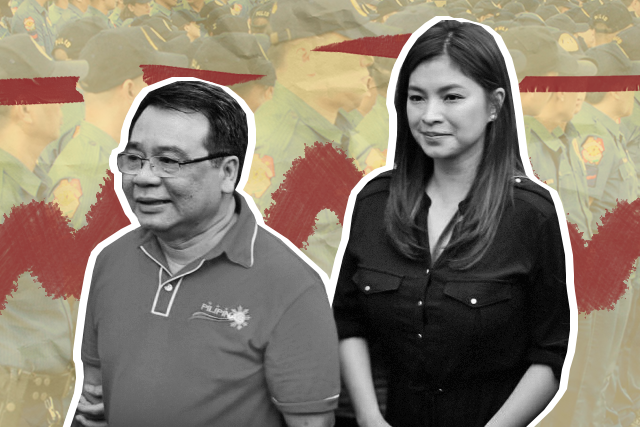Angel Locsin decried on Twitter the alleged red-tagging activity of some police officers in Manila against senatorial aspirant Neri Colmenares and other leftist party-list groups.
Election watchdog Kontra Daya Metro Manila caught this situation on camera and shared it online.
Locsin ranted on the spread of this false information.
“Bakit grabe yung effort para makasira? Wala bang maibato kay @ColmenaresPH kaya kinakalat na komunista o NPA siya? Dahil ba gumagawa siya ng paraan para sa kapakanan ng ordinaryong tao at hindi sa ikabubuti ng mga mapagsamantalang tao?” she said.
bakit grabe yung effort pra makasira? wala bang maibato kay @ColmenaresPH kaya kinakalat na komunista o NPA sya? dahil ba gumagawa sya ng paraan para sa kapakanan ng ordinaryong tao at hindi sa ikabubuti ng mga mapagsamantalang tao? Mag isip sana tayo https://t.co/yAoG4fIbSh
— Angel Locsin (@143redangel) May 13, 2019
The acclaimed actress said this as a form of propaganda against the human rights lawyer.
“It’s the lies and black propaganda I don’t understand. If you don’t believe in him don’t vote for him. Spreading lies and destroying the reputation of someone with pure intentions is what I don’t agree with,” Locsin said.
Police officers were seen handing out newsletters titled Pulis Serbis Balita headlined with articles accusing Colmenares and groups Bayan Muna and the Makabayan bloc as supporters of local terrorists on Election Day, May 13.
Pulis Serbis Balita is the official paper of the Philippine National Police.
Based on photos and videos online, the incident happened around Geronimo Elementary School in Sampaloc, Manila.
Confusing responses
The Twitter accounts of the Philippine National Police provided vague responses to Filipinos who asked about the issue.
Twitter user @momblogger brought this up to PNP Tweets, the police force’s official account.
PNP Tweets initially denied the red-tagging accusations.
Mam we will verify again. They are distributing PNP newspapers, but no publication of red tagging alleged.
— PNP Tweets (@PNPhotline) May 13, 2019
Then, the account of PNP’s Community Relations Group said: “It’s happening everyday ma’am. We are regularly distributing the tabloids to all places of convergence.”
PNPCRG soon denied this and noted that the newsletter in question is “not election-related.”
Philippine National Police Chief Oscar Albayalde assured that the police force remains non-partisan and apolitical.
“Remember, ang directive natin sa PNP is always remain non-partisan and apolitical. We do not meddle with the political exercise of anybody, or in any area,” Albayalde said.
He then urged those concerned to file charges to the police officers instead of speaking up.
“Palagi namang ganyan ang ginagawa nila. They can file the charges, everytime na merong sinasabi, always file charges. That’s their right, we respect their right,” Albayalde added.
Election propaganda
Election laws have specific provisions that prohibit the spread of similar content.
The Omnibus Election Code and the Fair Election Act stated that any newspaper, gazette, magazine or printed material for or against a political candidate should have the name and address of the payor and the printer.
Copies of it should also bear the words “paid for by” and “printed by.” —Artwork by Uela Altar-Badayos










